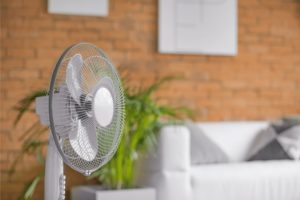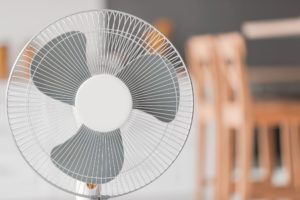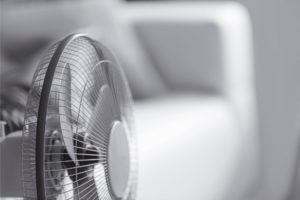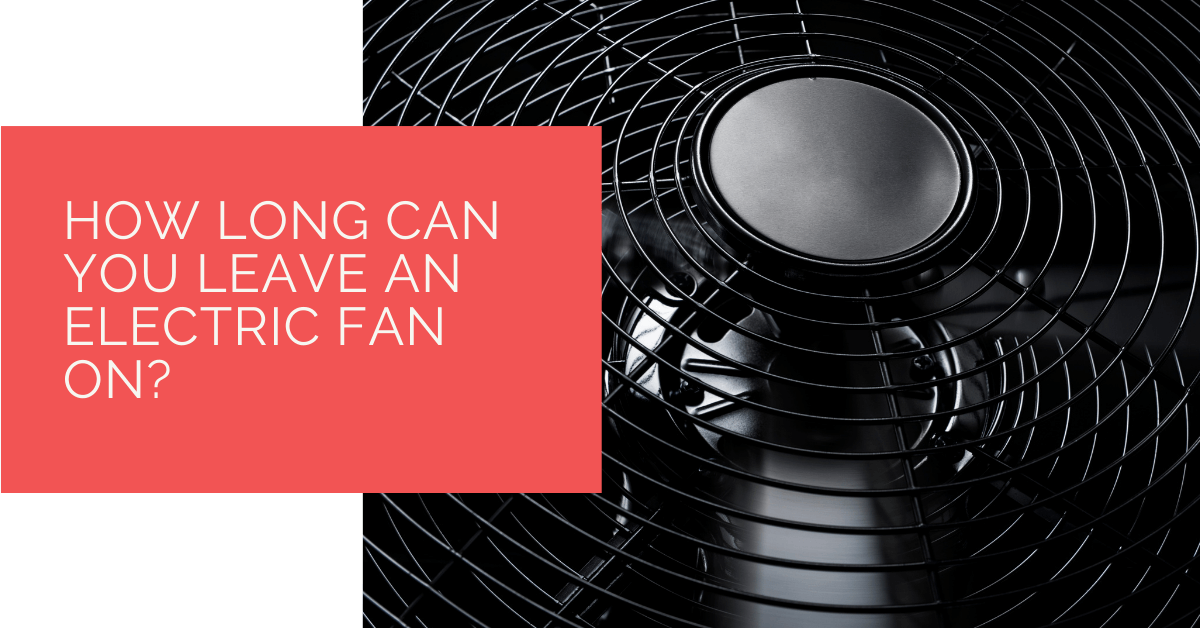Striking the right balance between comfort and safety is crucial. If you’ve been wondering about ceiling fans and their ideal usage, here’s what you should know.
Electric fans can operate efficiently for eight hours or more. In fact, with a fan running overnight, you won’t necessarily face hefty consumption bills. However, the real question is – should you leave fans running 24×7 or over eight hours?
The answer is subjective but can solve this common query of most house owners. This article explains how long you can ideally leave a fan running. In addition, it addresses relevant questions like – ‘can electric fans catch fire?’
So, here’s all you should know about electric fans in the UK, their operational, safety, and power consumption insights.
Contents
- 1 Key Takeaways
- 2 Understanding the Motive Behind Electric Fans
- 3 Keeping Electric Fans ON
- 4 Possible Fire Hazards
- 5 Ceiling Fans and Overheating Issues
- 6 Health Risks from Ceiling or Tower Fan
- 7 How Long Should a Ceiling Fan Run?
- 8 Benefits of Leaving Ceiling Fan ON at Night
- 9 Cost Breakdown of Keeping Fans ON for Long Periods
- 10 Note Down the Power Consumption Rating
- 11 Keeping An Electric Fan Active for Long Duration: Tips to Follow
- 12 Common Mistakes to Avoid
- 13 Frequently Asked Questions
- 14 Heat Pump Source: Reliable Heating and Cooling Solutions
- 15 Summing Up
Key Takeaways
- Electric fans can run efficiently for eight hours or more without significant consumption bills, but running them continuously for 24×7 or extended periods can lead to potential hazards and health risks.
- Leaving a fan on too long can pose fire hazards, cause overheating issues due to friction in the motor’s moving parts, and lead to health problems such as dry nasal passages, sinus headaches, and muscle cramps.
- Running electric fans for around eight hours is recommended during extreme requirements, ensuring safety, energy efficiency, and comfort. Additionally, using fans at night can help circulate cool air, reduce electricity bills, and provide a soothing environment for a good night’s sleep. Proper cleaning, maintenance, and placement are essential for safe and effective fan operation.
Understanding the Motive Behind Electric Fans
Why do you use electric fans?
Some people may give the ‘ventilation’ reason. On the other hand, some consumers might explain all about warm and cool air supply. Both answers are correct. However, these electrical appliances have a lot to offer.
Here are the objectives behind the electric fan invention:
- To increase the heat transfer coefficient
- For providing a breezy sensation to occupants
- Air circulation (ventilation)
- To exhaust dust and other pollutants
- Decreasing load on air conditioners
Overall, fans have many benefits. However, they do not cool hot air or temperature. Regardless of your personal preference, keeping the fan ON for long periods impact multiple factors. Let’s understand the ideal duration of the electric fan and its related effect on various parameters.
Keeping Electric Fans ON
Ceiling fans or a box fan, these electrical appliances do not reduce the temperature in hot weather. Hence, if you leave your fan running for prolonged durations, other valid reasons should be.
Ceiling fans provide much-needed relief by dissipating hot air from the room. In other words, fans are ideal for blowing air and preventing stagnation.
So, it can be tempting to leave your fan running continuously. However, you may invite a fire hazard, overheating issues, and potential health risks to get some comfort.
Let us analyse each issue in depth.

Possible Fire Hazards
A ceiling fan from a reputed brand won’t usually lead to fire hazards all the time. In such a case, it is ideal for reading the manufacturer catalogue.
Generally, the company mentions the most extended duration to keep a fan active. A ceiling fan running for eight consecutive hours will not overheat in most cases.
Removing them is a good idea if you have accessories or decorative items attached temporarily to the fan blades. After all, it would help if you didn’t risk a slight possibility of fire accidents.
Ceiling Fans and Overheating Issues
Let us consider you keep the electric fan running 24×7 in summer. Will this habit lead to safety issues and overheating?
In a word, ‘yes.’ The motor that powers your electric fan has several moving parts. Constant 24×7 working leads to friction between these components.
This friction can cause heat build-up, leading to overheating of the fan. In addition, fans do not contain circuit breakers. So, safe practice to avoid the minor chance of overheating is to refrain from 24×7 fan operation.
Health Risks from Ceiling or Tower Fan
An electric fan cannot make a person sick. However, a fan blowing air continuously may lead to the following ill-effects:
- Circulating air can dry the nasal passages
- You might get sinus headaches
- A dusty fan can make cold symptoms worse
- Concentrated ceiling fan air can lead to muscle cramps
Substituting with box fans won’t make a massive difference to the potential health hazards. In addition, if your room has cooler air due to an AC, a fan will circulate this cold air.
Hence, fans can worsen the health condition of occupants suffering from flu symptoms.
How Long Should a Ceiling Fan Run?
There is always a massive difference between ‘can’ and ‘should.’ In the case of a modern electric fan, the above ill-effects have a slight possibility of occurrence.
Still, it is better to devise a simple plan to keep your ceiling fan ON. In short, you ‘can’ run the electric fan all the time. However, you ‘should’ turn these appliances OFF after regular intervals.
If you aren’t at home, keeping the electric fan ON for some hours is fine. In such a scenario, you do not risk any health hazard. But, you still have to pay additional electric bills and have a slight chance of overheating issues.
So, how long? Around eight hours in extreme requirements. However, if you need to keep it on for prolonged durations, keep the windows open to allow constant redistribution of air.

Benefits of Leaving Ceiling Fan ON at Night
With advanced technology and sophisticated manufacturing methods, fans are safe and reliable. On the whole, moderate use of a ceiling fan will not make you sick or cause electrical problems.
Circulation of Cool Air in Summer
Appliances like box fans can induce a comforting sleep at night. A box fan can recirculate cold air throughout the room with an air conditioner.
Also, these units’ soothing ‘white noise’ leads to a relaxed sleep.
Reduction in Consumption Bills
Fans will reduce your electric bills even if they run all night. With cooler air at night, a fan can provide optimum comfort due to low power consumption.
The average cost of a fan running in a room ranges between 5p to 14p. At the same time, an AC costs around £4 per day for an active eight-hour duration. So, in comparison with an air conditioner, using an electric fan will certainly prove economical.
A Good Night Sleep
A well-maintained fan can help produce a soothing rotational sound. Newer fan models have a silent motor that doesn’t interrupt the white noise.
Hence, you get proper sleep without any unusual noises under the fan. Also, a 12-hour working won’t consume much electricity like an air conditioner.
Cost Breakdown of Keeping Fans ON for Long Periods
The great news with household fans is the comparatively low consumption of electricity. To calculate your fan’s power consumption, follow these steps.
Note Down the Power Consumption Rating
Every type of fan has a ‘wattage’ rating. In some cases, you might find a kW rating, a 1000x multiple of a watt. To calculate the power consumption, you can use online tools.
However, the process is straightforward. It is as simple as calculating the power consumption of residential light bulbs.
Divide the Wattage Rating
The next step to finding the power consumption rate of your residential fan is to divide the wattage rating. The division factor in this calculation is 1000.
This step will give you the output per hour of the residential fan.
Multiply by Operational Hours
The eight-hour mark is an optimum duration to keep the electric fan active. Why? An average nightly sleep is eight hours.
So, in most cases, you need to multiply the value from step two by eight. Still, if you keep the fan ON for 12 hours, use the adequate number.
Analyse Your Energy Bill
Finally, you need to find the amount of money you pay per kW. This amount is usually easy to locate on your monthly electricity bill.
Next, multiply this amount per kW with the value in step three. Consequently, you will get the final cost of your electric fan.
Example
Consider you have an electric fan of 50 Watts. As explained in step two, divide 50 by 1000. Hence, the answer is 0.05. Next, if we consider an eight-hour duration, the answer is: 0.05 x 8 = 0.4 kW.
If you pay 10p per kW, here’s the final running cost: 0.4 x 10 = 4p. So, you only pay fourpence for an eight-hour-long comfortable sleep.

Keeping An Electric Fan Active for Long Duration: Tips to Follow
The fan can safely run and disconnect under extreme load if a circuit breaker is installed. So, if you desire to combat the heat and keep the fan running throughout the day, follow these tips.
Prior Cleaning Activity
Keeping the fan active for longer durations is a natural preference to combat the hot summer. However, be prompt in cleaning the dust on the blades and fan body.
This habit is essential to prevent dust particulates from circulating in the room. In the case of box fans, you can store them away to avoid unnecessary dust accumulation before summer.
Place the Electric Fan at Appropriate Distance
According to Public Health England, you should keep fans at a reasonable distance from occupants. This strategy helps avoid the disproportionate impact of air directly on the skin.
For this purpose, an extension cord can prove helpful. Hence, the room will stay cool without any health and safety hazards to occupants or patients.
Recheck the Installation
In the case of ceiling fans, you need to verify if the installation is secure. Any unusual noises or delayed reaction time can be a sign of improper fitting.
So, it is advisable to call the local electrician if you notice such issues. Also, check for other electrical components like a circuit breaker in the residential connection system.
Common Mistakes to Avoid
All in all, keeping the fan ON for a specific period depends on your personal choice. Ideally, eight hours is a sufficient duration. But you might need to keep the fan running for long to ventilate and combat the heat.
In such cases, consumers often tend to make mistakes that can prove detrimental. Here are some errors that you can avoid easily.
Improper Electric Fan Selection
Box, desk, or tower, consumers can choose any model from the prominent fan types. Still, some people tend to make the wrong choice for a specific purpose.
For instance, buying a desk fan with a small motor does not blow air for the entire room. So, you cannot expect ventilation for the whole room with a desk fan. A tower or ceiling fan should be the ideal choice in such a case.
Overlooking the Brand Reputation
Some consumers do not pay close attention to the fan manufacturer. Consequently, they can end up buying an appliance with a faulty design or poor service life. Proper research before choosing the right fan brand helps in such cases.
Generally, reputed companies follow strict production and quality control measures. Hence, electric fans from such brands have fewer chances of overheating and catching fire. Also, they consume a stable amount of electricity, thereby saving money continually.
Frequently Asked Questions
Can electric fans cause facial paralysis?
Electric fans can dry your nasal passages, causing dry mouth and sinus headaches. However, there is no direct link between paralysis and electric fans.
Still, it is better to use an electric fan in a controlled manner. Such habits can prevent many practical issues. It is also crucial to realise that every person can react to the constant breeze from the fan differently.
Can I make my room colder without an AC?
The short answer is yes. Leaving the windows open at night will allow cool air to enter your room. Also, you can use the ceiling fan to recirculate this air throughout the room.
Another tip is to place a bowl with ice in front of a box or desk fan. The air from the fan blades will utilise the cool effect of the ice. Consequently, you will notice high comfort due to the cooler breeze circulating in the room.
Heat Pump Source: Reliable Heating and Cooling Solutions
At Heat Pump Source, we take pride in our unwavering commitment to serving the UK with top-tier HVAC solutions. From the efficiency of heat pumps and the cool relief of air conditioning to the warmth of boilers, radiators, and underfloor heating, our dedicated team is always at the forefront of innovation. We understand the unique needs of every household and business, and we strive to provide dependable health and cooling products and services that are tailored just for you. Ensuring your comfort and satisfaction is our utmost priority. Whether you have questions, need guidance, or require support, we’re always here to assist. Please don’t hesitate to contact us; we’re eager to be of service.
Summing Up
Electric fans are simple appliances that do not impact your utility bills compared to air conditioners. Hence, a good quality electric fan can keep running all the time. Still, as a general utility tip, try to leave the fan ON for an average period of eight hours.
It is crucial to turn OFF the fan in regular intervals. This habit leads to the unit’s low wear and tear of moving components. Hence, the chances of overheating are reduced significantly. In addition, using the fan in a controlled manner prevents sinus headaches at night.
Finally, following the tips mentioned to maintain healthy gadget habits is useful. After all, proper maintenance of an electric fan helps to keep most issues away.
About the Author
At Heat Pump Source, our articles are the product of a collaborative effort among a team of highly skilled HVAC experts. Our dedicated professionals, hailing from diverse backgrounds in heating, ventilation, air conditioning, and refrigeration, contribute their extensive knowledge and experience to every piece of content. This multidisciplinary approach ensures comprehensive coverage. Our commitment is to deliver authoritative, reliable, and tailored advice to meet the unique needs of every household and business across the UK.

